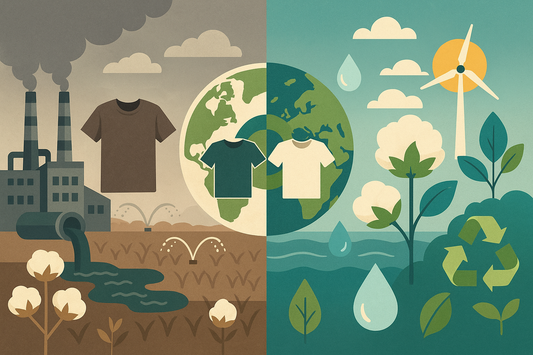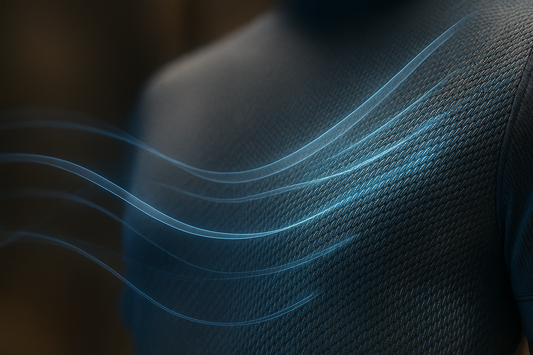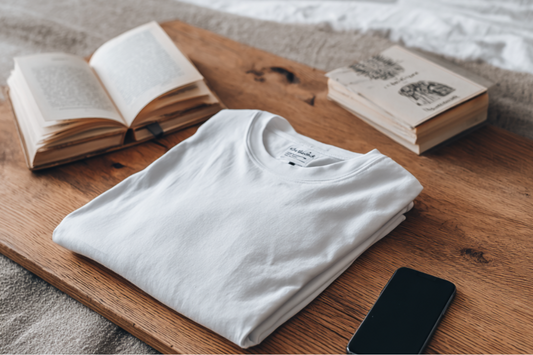
The Benefits of Bamboo Fabric in T-Shirts
The textile industry is experiencing a revolutionary shift toward sustainable and performance-driven materials, with bamboo fabric leading this transformation. As consumers become increasingly conscious of environmental impact and demand superior comfort, bamboo T-shirts have emerged as the perfect solution combining ecological responsibility with exceptional performance characteristics.
Bamboo fabric represents more than just another textile option—it's a game-changing material that addresses modern consumer needs for comfort, sustainability, and performance. Understanding the unique benefits of bamboo fabric helps apparel brands position themselves at the forefront of textile innovation while meeting evolving customer expectations.
In this comprehensive guide, we'll explore why bamboo fabric is revolutionizing T-shirt production and how it can enhance your brand's offerings with superior comfort and environmental credentials.
What Makes Bamboo Fabric Special?
Bamboo fabric is derived from bamboo pulp through an eco-friendly process that transforms one of nature's most sustainable plants into luxuriously soft textile fibers. The natural properties of bamboo translate directly into fabric characteristics that surpass traditional cotton in multiple performance areas.
Unlike conventional cotton that requires extensive water, pesticides, and fertilizers, bamboo grows rapidly without additional resources, making it inherently sustainable. The bamboo plant regenerates from its root system, eliminating the need for replanting and supporting continuous harvesting cycles.
Natural Fiber Properties
Bamboo's cellular structure creates unique fabric characteristics that provide exceptional comfort and performance. The naturally hollow bamboo fibers offer superior breathability and moisture management, while the smooth fiber surface creates an incredibly soft hand-feel that rivals silk and cashmere.
Key Benefits of Bamboo Fabric T-Shirts
Superior Moisture Management
Bamboo fabric excels in moisture-wicking capabilities, absorbing moisture 60% more effectively than cotton. The natural micro-gaps in bamboo fibers create excellent ventilation, allowing air to circulate freely and keeping wearers dry and comfortable throughout the day.
This exceptional moisture management makes bamboo T-shirts ideal for: • Active lifestyles and athletic activities • Hot and humid climate conditions • All-day wear requiring consistent comfort • Professional environments where appearance matters
Natural Antibacterial Properties
One of bamboo's most remarkable characteristics is its natural antibacterial agent called "bamboo kun." This bio-agent provides inherent antimicrobial properties that resist bacteria growth, reducing odors and maintaining freshness longer than conventional fabrics.
The antibacterial benefits include: • Reduced odor retention for extended wear • Natural hygiene properties without chemical treatments • Longer periods between washing requirements • Healthier skin contact with reduced bacterial exposure
Temperature Regulation
Bamboo fabric provides excellent thermal regulation, keeping wearers cool in summer and warm in winter. The natural breathability and insulation properties adapt to body temperature and environmental conditions, creating consistent comfort across varying situations.
Hypoallergenic Qualities
Bamboo fabric is naturally hypoallergenic, making it ideal for individuals with sensitive skin or allergies. The smooth fiber surface reduces skin irritation while the natural properties eliminate the need for harsh chemical treatments that can cause allergic reactions.
Environmental Advantages
Sustainable Growth Characteristics
Bamboo represents one of the most sustainable textile sources available: • Grows 30 times faster than cotton • Requires no pesticides or fertilizers • Uses 95% less water than cotton production • Regenerates from root system without replanting • Produces 35% more oxygen than equivalent cotton crops
Carbon Footprint Reduction
Bamboo cultivation actively reduces carbon dioxide levels while producing oxygen, creating a net positive environmental impact. The rapid growth cycle and efficient processing methods result in significantly lower carbon footprints compared to conventional textile production.
Biodegradable Properties
Bamboo fabric is completely biodegradable, returning to earth naturally without environmental harm. This end-of-life benefit supports circular economy principles and reduces textile waste in landfills.
Performance Comparison: Bamboo vs. Traditional Fabrics
|
Property |
Bamboo Fabric |
Cotton |
Polyester |
Bamboo Advantage |
|
Moisture Absorption |
60% higher than cotton |
Standard baseline |
Poor absorption |
Superior wicking |
|
Antibacterial |
Natural bamboo kun |
Requires treatments |
No natural properties |
Inherent protection |
|
Softness |
Silk-like smoothness |
Good comfort |
Synthetic feel |
Luxury hand-feel |
|
Breathability |
Excellent ventilation |
Moderate |
Poor ventilation |
Enhanced comfort |
|
UV Protection |
Natural UPF 50+ |
Minimal protection |
Variable |
Built-in protection |
|
Durability |
High strength |
Good durability |
Excellent |
Comparable strength |
|
Environmental Impact |
Highly sustainable |
Resource intensive |
Petroleum-based |
Eco-friendly choice |
|
Hypoallergenic |
Naturally gentle |
Potential irritants |
Chemical sensitivities |
Skin-friendly |
Applications and Target Markets
Athletic and Active Wear
Bamboo T-shirts excel in athletic applications due to superior moisture management and temperature regulation. The natural properties provide performance benefits without synthetic treatments, appealing to health-conscious athletes and fitness enthusiasts.
Luxury Casual Wear
The silk-like softness and elegant drape of bamboo fabric position it perfectly for premium casual wear markets. Consumers seeking luxury comfort without environmental compromise find bamboo T-shirts irresistible.
Sensitive Skin Solutions
Individuals with skin sensitivities, allergies, or conditions like eczema benefit significantly from bamboo fabric's hypoallergenic properties and smooth texture.
Eco-Conscious Consumers
Growing environmental awareness drives demand for sustainable textile options. Bamboo fabric appeals to consumers prioritizing ecological responsibility without sacrificing comfort or performance.
Production Considerations
Fabric Processing
Modern bamboo textile processing uses closed-loop systems that recycle chemicals and minimize environmental impact. Advanced processing techniques maintain bamboo's natural properties while creating consistent, high-quality fabrics suitable for commercial production.
Quality Control Standards
Bamboo fabric requires specific quality control measures to ensure consistent performance characteristics. Testing protocols should include moisture management verification, antibacterial property confirmation, and durability assessments.
Supply Chain Management
Establishing reliable bamboo fabric supply chains requires working with specialized suppliers who understand processing requirements and quality standards. Consistent sourcing ensures product reliability and customer satisfaction.
Market Positioning Strategies
Premium Positioning
Bamboo T-shirts justify premium pricing through superior comfort, performance benefits, and environmental credentials. Marketing should emphasize luxury feel and sustainable choice positioning.
Performance Marketing
Athletic and active wear markets respond well to performance-focused messaging highlighting moisture management, temperature regulation, and antibacterial properties.
Sustainability Focus
Environmental consciousness drives purchasing decisions for many consumers. Emphasizing bamboo's sustainable cultivation and biodegradable properties appeals to eco-minded customers.
Care and Maintenance Benefits
Easy Care Requirements
Bamboo T-shirts maintain their properties with simple care routines. The natural antibacterial properties reduce washing frequency requirements while the durable fibers withstand regular laundering without deterioration.
Longevity Advantages
The strength and resilience of bamboo fibers ensure T-shirts maintain their appearance and performance characteristics through extended use and multiple wash cycles.
Future of Bamboo Textiles
Innovation Developments
Ongoing research continues improving bamboo fabric processing and performance characteristics. New developments in fiber treatments and blending techniques expand application possibilities and enhance benefits.
Market Growth Projections
The bamboo textile market continues expanding as consumer awareness increases and processing technologies improve. Forward-thinking brands positioning themselves in bamboo textiles gain competitive advantages in growing sustainable fashion markets.
Implementation Recommendations
Brands considering bamboo fabric T-shirts should evaluate target markets, positioning strategies, and supply chain requirements. Success requires understanding customer needs and effectively communicating bamboo fabric benefits.
Partner with experienced suppliers who specialize in bamboo textiles and understand quality requirements. Proper sourcing ensures consistent product characteristics and customer satisfaction.
Ready to Explore Bamboo Fabric Opportunities?
At Varthagam International, we specialize in high-quality bamboo fabrics that deliver exceptional comfort and performance for T-shirt production. Our sustainable bamboo options provide the perfect foundation for premium, eco-friendly apparel collections.
Visit Varthagam international.in or Book a Call with us or Chat with us on Whatsapp to discuss your bamboo fabric requirements and discover how this revolutionary material can enhance your T-shirt offerings.



